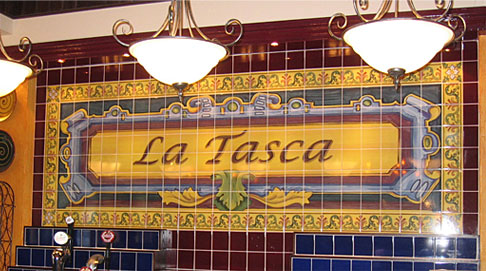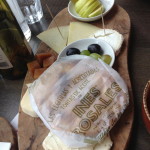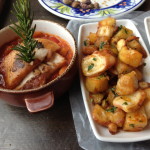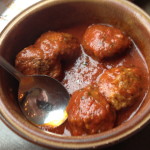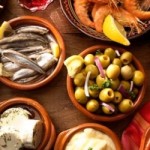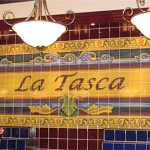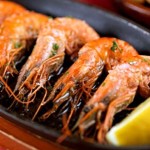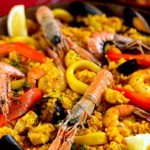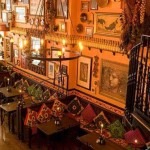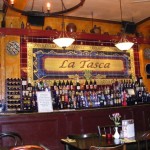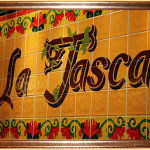La Tasca is a chain of Spanish-style tapas restaurants formerly owned and run by Bay Restaurants but now under the control of two banks, one Icelandic and the other German (Kaupthing and Commerzbank), who between them seem to have sorted out an array of financial problems with the chain. The first was opened in Manchester in 1993, and now extends to 42 branches, each bedecked with the chain’s distinctive branding.
Debts notwithstanding, La Tasca is still here by virtue of the increasing popularity of Spanish food with we Brits, and the fact that as Tapas restaurants go they do a moderately decent job of the food and atmosphere. Not maybe a Rolls Royce or Ferrari of the tapas world, certainly compared to the glorious originals in Spain or some of the more upmarket entries to the field in London, for example, but a solid and worthy contender, maybe a Ford Mondeo.
Spanish waiting staff were undoubtedly good news, particularly since they greeted me with a smile and were evidently enjoying their job. They were not over-attentive but did ask on a couple of occasions if everything was OK, and like waiters everywhere they vanished into the ether when it came time to ask for the bill. They did however take the orders efficiently, starting with drinks. Here you realise that mark-ups here are fairly stiff – a 33cl bottle of San Miguel will set you back £3.70 for example, which seems a touch mean.
The food comes along at a rattling pace, though you do have to order everything, including the olives and bread that would in Spain be on the table from the start. Both were acceptable without being exceptional: the olives were average and the bread much the same. There was a deluxe artisan bread option at higher price, which seemed to my eyes a tad stingy, though the standard package did at least come with a crisp and satisfying wax-papered torta flatbread.
I tried a combination of hot and cold plates. Arguably the least successful was the easiest to do well, namely Serrano ham. Top quality raw materials in the air-dried ham league can be pricy, but it doesn’t have to to be the rarest acorn-fed jamón ibérico de bellota to deliver excellence.
When there is no cooking involved, this is one area where quality of ingredients shine, though this was more at the supermarket end of the market, lacking the aroma, texture and depth of flavour to be found in the finest hams, sliced freshly from the joint. This demands great skill, hence the sliced ham almost certainly arrives from a factory, ready sliced and vacuum-packed, where in Spain even the most humble of tapas bars would carve fresh hams from the joint.
A cheese platter was a tad more successful, including a variety of well-kept Spanish comestibles, none of which was fridge-cold. The inclusion of some cubed dulce de membrillo (Spanish quince paste) was a welcome and authentic sight, though the accompanying grapes and apple contrived to look tired. Good cheese though, so thumbs up for that.
The hot dishes proved pretty successful, especially a bowl of melting pork belly with stewed beans and rosemary, and also tender slices of octopus with cubed sautéed potatoes. The waiter plugged the home-made mini-beefburgers pretty hard so I did have a go at them. A pleasingly smoky flavour was supplemented by a mound of commercial caramelised onion chutney and mayo, but the beef was unquestionably worth a nibble.
These hot tapas clearly demonstrated chain food at its best, being more than adequate, though this makes the lack of consistency of attention to detail elsewhere slightly frustrating. If you frequent La Tasca you can probably build a clearer map of what works and what works less well, they navigate your way through the sizeable options, chef specials and new dishes with great success. As it is, a menu packed with dishes is bound to produce the odd duffer, though if this tiny sample were to be representative hot works slightly better than cold.
Another time I will try their paella, a dish which generally sorts the hombres from the chicos. The problem is the same as risotti in Italian restaurants, namely that if you cook your rice in advance, you need to prevent it from overcooking and turning to mush. Very few, and generally the best only, get this technique right, quite apart from cooking a tasty range of authentic accompaniments to the paella. On the menu here are five variants, none of which seems to include rabbit, a key ingredient you will find used off the tourist trail throughout much of Spain.
So then, what of La Tasca? Competent but not exceptional: it does pretty much everything moderately well, from decor to service to food, and does nothing badly without ever convincing you it is a world leader in its field – and to some extent at least, its chain status demands that it is the lowest common denominator, the standard accepted by the majority.
Like tapas restaurants everywhere you have to watch the plates since the cost mounts up steeply, and the price of drinks and desserts will add considerably. Quality has to be considered against the price bracket, so La Tasca is marked down a peg or two for the odd sloppy error and mediocre dish. Whether their products represent value for money you must decide for yourself, though to my mind I’ve certainly had better tapas cheaper and fresher – and with all small dish restaurants, the price mounts up rapidly when you eat a few of them.
If price is not a consideration this is a chain worth trying, though I’d advise you also to have a bash at one of the top tapas specialists for comparison – sometimes it pays to drive a Ferrari!

